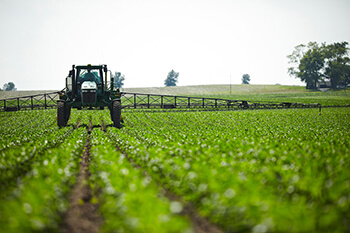Three Actions to Get the Most from your Adjuvant
Feb 17, 2020

Darrin Holder, Agronomist Winfield United
A tractor is a necessity on the farm, but without fuel it’s useless. The same principle applies to herbicides and adjuvants. Until a herbicide’s active ingredient meets its intended target, it doesn’t really have much benefit. That’s why adjuvants are an essential tank-mix partner for effective weed control. Here are three actions you can take to ensure your weed control program gets the job done.
Adjuvants are essential for achieving optimum weed control. But not all adjuvants work the same, so it’s important to work with your trusted agronomic advisor to choose the right products for your specific needs. Seek adjuvants from reputable companies and ask for data to back any performance claims. For more information about how adjuvants can help you battle weeds more effectively, plan to visit a clinic hosted by your local TFC and WinField United retailer.
A tractor is a necessity on the farm, but without fuel it’s useless. The same principle applies to herbicides and adjuvants. Until a herbicide’s active ingredient meets its intended target, it doesn’t really have much benefit. That’s why adjuvants are an essential tank-mix partner for effective weed control. Here are three actions you can take to ensure your weed control program gets the job done.
- Know your water. Water conditioners are one class of adjuvants that can make a big impact on herbicide efficacy. Minerals in water can tie up a product’s active ingredient in the spray tank, making it less effective on weeds. In addition, water conditioners help keep herbicides active on the leaf surface, where free cations from the soil and the plant bind up herbicide active ingredients. Depending on the composition of your water, there are wide use rates for water conditioners that can impact the effectiveness of weed control and the price per acre of the application.
- Think like a weed. Weeds come in all shapes and sizes and have different biological characteristics and life cycles. That’s why you need to identify the most problematic weeds in your field and then think about what it will take to knock those weeds out. For example, some weeds have leaf hairs or a waxy cuticle that make it more difficult for a herbicide to penetrate. In that case, non-ionic surfactants or oils added to the tank can help get the active ingredient into the plant for better weed control. Surfactants and oils are other classes of adjuvant that are formulated to increase herbicide penetration and reduce surface tension.
- Get to the target. I’ve seen a lot of people get the first two steps right, only to mess up when it comes to the actual application. The ultimate goal is to get as much herbicide active ingredient as possible to the target location, whether that’s a weed or the soil. If you don’t hit that target, then you won’t get effective weed control, no matter what you’ve got in the tank. Research shows that up to 20 percent of the active ingredient can be lost before it even reaches its intended target. But drift reduction adjuvants, including InterLock® adjuvant, actually optimize droplet size for more precise deposition and coverage to help ensure that more active ingredient reaches its target.
Adjuvants are essential for achieving optimum weed control. But not all adjuvants work the same, so it’s important to work with your trusted agronomic advisor to choose the right products for your specific needs. Seek adjuvants from reputable companies and ask for data to back any performance claims. For more information about how adjuvants can help you battle weeds more effectively, plan to visit a clinic hosted by your local TFC and WinField United retailer.